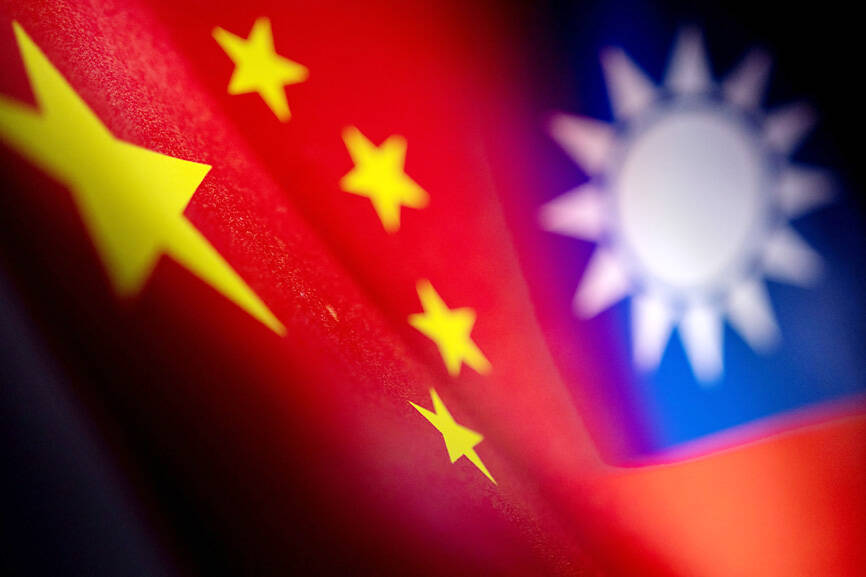China might implement pressure campaigns in the run-up to Taiwan’s presidential election next month, including introducing investment incentives and conducting military exercises around the country, to try and sway voters to cast their ballot in a more pro-Beijing direction, an expert said on Thursday.
In contrast to how official communications with Taiwan were severed after President Tsai Ing-wen (蔡英文) won her first-term victory in 2016, the Chinese Communist Party (CCP) has continued full steam ahead in its efforts to win the hearts of Taiwanese business people, said Kung Shan-son (龔祥生), a researcher at the Taiwan government-funded think tank Institute for National Defense and Security Research.
At a forum in Taipei, Kung highlighted that in September, as Taiwan’s election campaign intensified, China announced a total of 22 new policies aimed at facilitating the creation of a “demonstration zone” in coastal Fujian Province to facilitate cross-strait economic collaboration.

Photo: Reuters
On the military front, in the past China has hesitated to employ military pressure in the run-up to a major Taiwanese election, fearing that such aggressiveness could cause Taiwanese to vote for an anti-Beijing party, he said.
However, there might be less incentive for China to exercise restraint this year, as voters are more set on which way they will vote, which could leave less room for Beijing’s “carrot” approach to sway a meaningful amount of voters, he said.
He added the CCP might not be laser-focused on working toward one “particular political party” being elected, as has traditionally been the case, although he did not mention which party he was referring to.
The Chinese Nationalist Party ‘s (KMT) presidential nominee, New Taipei City Mayor Hou You-yi (侯友宜), who is more China-friendly, is trailing the Democratic Progressive Party’s (DPP) nominee, Vice President William Lai (賴清德) and Taiwan People’s Party Chairman and presidential candidate Ko Wen-je (柯文哲) in polls for months.
However, Hou has gained momentum among the KMT base since announcing media personality and opinion leader Jaw Shaw-kong (趙少康) as his running mate last week, and while still lagging behind Lai, he is now polling ahead of Ko in most polls released this week.
In addition to military exercises around Taiwan, the CCP could employ coercive economic and trade policies as tools of intimidation in the lead-up to the Jan. 13 elections, with the aim of influencing Taiwanese voters, Kung said.
These might include measures similar to the banning of Taiwanese mangoes in August, he added.
The Taiwanese government labeled the ban on the fruit as “meddling in the presidential election,” while China attributed the move to the discovery of agricultural pests in recent shipments.
The CCP may, at the right time, lift the ban in a bid to showcase “goodwill” toward Taiwan, the expert said.
However, the effectiveness of the “carrot and stick” strategy might not meet the CCP’s expectations, as Taiwanese voters are accustomed to such approaches before elections, Kung said.
Given the downturn in China’s economy, investment incentives might not yield anticipated results, he said.

Taiwanese can file complaints with the Tourism Administration to report travel agencies if their activities caused termination of a person’s citizenship, Mainland Affairs Council Minister Chiu Chui-cheng (邱垂正) said yesterday, after a podcaster highlighted a case in which a person’s citizenship was canceled for receiving a single-use Chinese passport to enter Russia. The council is aware of incidents in which people who signed up through Chinese travel agencies for tours of Russia were told they could obtain Russian visas and fast-track border clearance, Chiu told reporters on the sidelines of an event in Taipei. However, the travel agencies actually applied

Japanese footwear brand Onitsuka Tiger today issued a public apology and said it has suspended an employee amid allegations that the staff member discriminated against a Vietnamese customer at its Taipei 101 store. Posting on the social media platform Threads yesterday, a user said that an employee at the store said that “those shoes are very expensive” when her friend, who is a migrant worker from Vietnam, asked for assistance. The employee then ignored her until she asked again, to which she replied: "We don't have a size 37." The post had amassed nearly 26,000 likes and 916 comments as of this

New measures aimed at making Taiwan more attractive to foreign professionals came into effect this month, the National Development Council said yesterday. Among the changes, international students at Taiwanese universities would be able to work in Taiwan without a work permit in the two years after they graduate, explainer materials provided by the council said. In addition, foreign nationals who graduated from one of the world’s top 200 universities within the past five years can also apply for a two-year open work permit. Previously, those graduates would have needed to apply for a work permit using point-based criteria or have a Taiwanese company

The Shilin District Prosecutors’ Office yesterday indicted two Taiwanese and issued a wanted notice for Pete Liu (劉作虎), founder of Shenzhen-based smartphone manufacturer OnePlus Technology Co (萬普拉斯科技), for allegedly contravening the Act Governing Relations Between the People of the Taiwan Area and the Mainland Area (臺灣地區與大陸地區人民關係條例) by poaching 70 engineers in Taiwan. Liu allegedly traveled to Taiwan at the end of 2014 and met with a Taiwanese man surnamed Lin (林) to discuss establishing a mobile software research and development (R&D) team in Taiwan, prosecutors said. Without approval from the government, Lin, following Liu’s instructions, recruited more than 70 software